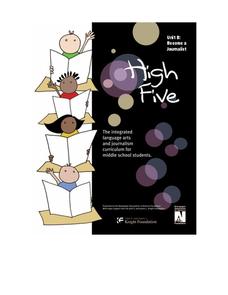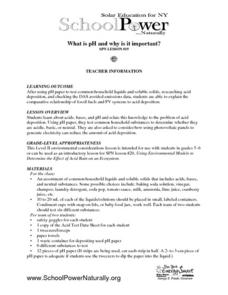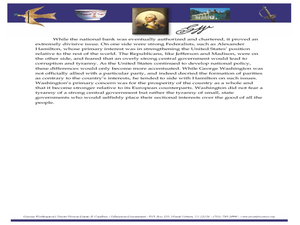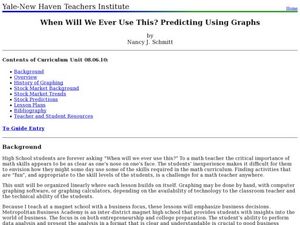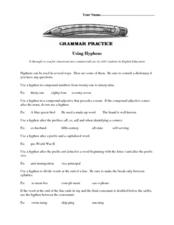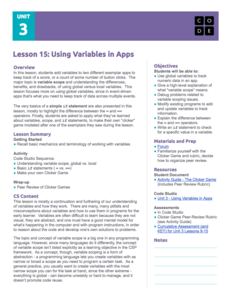Online Publications
Become a Journalist
Explore the newspaper as a unique entity with a detailed and extended unit. The unit requires learners to consider the newspaper's role in democracy, think about ethics, practice writing and interviewing, and examine advertising and news...
Teacher's Corner
Cinquain (sink-ain)
The cinquain, a five line, fixed-form poem that features one subject, is the focus of the third exercise in a series of ten poetry writing resources.
John F. Kennedy Presidential Library & Museum
Analyzing the Inaugural Address
Get high school historians to step outside their own shoes by responding to JFK's inaugural address from the perspective of a civil rights activist, a soviet diplomat, or a Cuban exile. After a class discussion about the address, the...
Science 4 Inquiry
Maintaining Mass
Can you disprove the law of conservation of mass? Pupils observe the teacher weigh each part of a reaction. Then, the teacher weighs the result of the reaction and everyone sees that the products do not equal the reactants. Then they...
Curated OER
There Is / Are / Some / Any
In this there is, are, some, and any worksheet, learners fill in the blanks to sentences and label pictures with there is, some, are, and any. Students complete 2 activities.
Curated OER
What are Metamorphic Rocks and How are They Formed?
Even though the student handouts are not included in the write-up, this lesson contains the instructions for terrific activities to use when teaching middle schoolers about metamorphic rocks. First, they compare granite to gneiss and...
Curated OER
Everything is Made of Something
Young scientists can use this activity to learn about natural resources, as well as what we use them for. A word search prompts pupils to find sixteen words about natural resources.
Curated OER
Using Poetry in Teaching Reading to Special Education Students
A series of well-written activities, these lessons prompt middle schoolers reading below grade level (at a second, third, or fourth grade level) to use poetry to practice basic reading skills. They rhyme, build words, make inferences,...
Curated OER
What Is Clay?
This resource could come in handy the next time you feel like teaching about clay. Basic sculpting techniques, vocabulary, and history of clay are outlined in this informative resource. Use prior to teaching an art project involving...
Curated OER
Addition Polymerization: Preparation of Polystyrene Using Two Types of Initiators
Advanced chemistry classes compare the polymerization of styrene using two different initators: benzoyl peroxide and aluminum chloride. Once they synthesize polystyrene, they compare the two producet for melting point and density. There...
Curated OER
Using the Subjunctive
How can you get your class to remember how to use the subjunctive tense in French? Create mobiles and booklets! Pupils work in groups to make mobiles that depict the correct usage of the subjunctive, and for each time they use one of the...
Curated OER
What Kind of Ladybug Are You?
As a class, read different sentences prepared by the teacher, identifying the punctuation that is needed for the appropriate expression. In small groups, have each child assume the role of one or more character in The Grouchy Ladybug by...
Curated OER
What is pH and Why is It Important?
Students investigate about acids, bases, and pH and relate this information to the problem of acid deposition. They use pH paper, students test common household substances to determine whether they are acidic, basic, or neutral. Pupils...
Curated OER
How Are My Social Skills?
An outstanding activity on social skills is here for you. This four-page activity poses 25 skills for learners to consider, and rate themselves on using a 1 - 5 scale. At the bottom of the sheet, they must choose five skills they feel...
Curated OER
Using Addends and Sum/Using Subtrahend, Minuend, and Difference
What is an addend? What is a sum? Review this math terminology on the top half of the worksheet before practicing basic addition.
Curated OER
Using Political Cartoons to Understand Historical Events
Examine historical perspectives through the use of political cartoons. Learners complete analysis activities related to the president's title, the establishment of the national bank, and the Jay Treaty.
Curated OER
When Will We Ever Use This? Predicting Using Graphs
Here are a set of graphing lessons that have a real-world business focus. Math skills include creating a scatter plot or line graph, fitting a line to a scatter plot, and making predictions. These lessons are aimed at an algebra 1 level...
Curated OER
Using Hyphens
Teaching grammar can be so difficult! Help your class master how to use hyphens correctly. The first page details different places one would use a hyphen. On the second page, learners are introduced to two practice activities. In the...
Curated OER
Is It See-Through?
Explore transparancy with a science experiment on different materials. After reading an explanation on how to determine if something is see-through with a flashlight, kindergartners decide if certain materials are opaque or not....
Curated OER
Materials We Use
How can you tell if something is made out of wood, metal, or plastic? Kids use noise and visual cues to determine what various household items are made from. They then examine their toys at home and record the materials used to make...
Curated OER
Understanding and Using Root Words to Expand Vocabulary
Middle schoolers engage in a lesson which reminds them that root words indicate the base meaning of a word, and that those roots are found in many different words that have similar meanings. Pairs of pupils use construction paper and...
Illustrative Mathematics
How Many _______ Are In. . . ?
Help your learners gain meaningful understanding of dividing fractions using fraction models. The activity includes nine problems which are sequenced to show how the fraction division algorithm evolves. Have students use graph paper or...
Code.org
Using Variables in Apps
Investigate the benefits of using global variables. The seventh installment of a 21-part unit continues the study of variables from the previous lesson. Young computer scientists modify two existing apps by adding variables and learn how...
EngageNY
Using Sample Data to Compare the Means of Two or More Populations
Determine whether there is a difference between two grades. Teams generate random samples of two grade levels of individuals. Groups use the mean absolute deviation to determine whether there is a meaningful difference between the...


